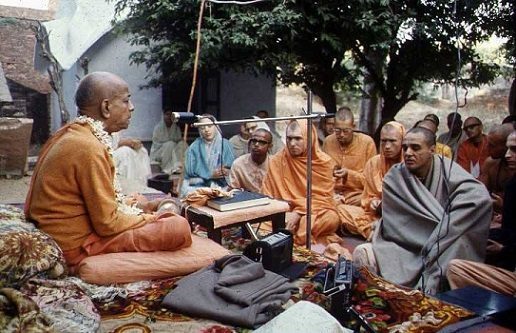Question: It’s often said that an aspiring devotee should never try to approach Krishna directly, that Krishna is pleased when we serve Him by serving His devotees, or that one should only try to approach Krishna through the Spiritual Master. I have also heard that rather than trying to serve Krishna directly, one should beg for mercy from Srimati Radharani to be allowed to serve Sri Krishna, as She is very merciful and it is only by Her mercy that we can serve Him.
When we are in association with devotees, such as in the Japa retreat or the temple, we are trying to directly connect with Krishna. It feels okay because we are doing so under the guidance and instructions of the Spiritual Master. But what do we do when we are not in the temple or with the Spiritual Master? What do we do when we are at home with our families and are trying to connect? Is it offensive in such an environment to try to connect directly with Sri Krishna?
Answer by Romapada Swami:
What you have stated in the first part of your question is the internal mood of a Vaishnava. Over and above the potential offense or neglect of protocol is the siddhanta, the fact that Krishna is much more easily accessible by connecting to the mercy of His pure devotees. As found in the Adi Purana, Krishna instructs that one who is the devotee of His devotee is His devotee.
Krishna is very difficult to be known for a conditioned soul. Even though He is within everyone’s heart, He is seated as though neutral. Only after many years, or even lifetimes, of practice and purification, one may be able to understand and serve Krishna (bahunam janmanam ante… ). But when we approach Krsna in the mood of being a devotee of His devotee, and we do devotional service as directed by them, it attracts Krishna’s attention very quickly. (yasya prasadad bhagavat prasado…)
Out of natural humility, a Vaishnava feels incapable of attracting Krishna’s attention directly. “Even great demigods, yogis, and pure-hearted sages are searching for the Supreme Truth, so how is it possible for an insignificant, conditioned soul like me to even know Krishna, what to speak of approach Him or chant His Holy Name purely?” In this humble state of consciousness, they take shelter in those who are very dear to Krishna.
Even Queen Kunti prays in this way — Krishna was directly standing before her, but she approaches Krishna through those who are very dear to Him, by addressing Him as Vaasudeva, Devaki-nandana, Nanda-gopa-kumara, etc. (See Kunti’s prayers SB 1.8.20-21) Similarly, even when he was face to face with Lord Narasimhadev, Prahlada presented himself as the servant of his spiritual master, Narada.
Approaching through the devotee does not necessarily mean through physical contact (as illustrated in the above examples of Kunti and Prahlada). It means being *conscious* of and *feeling dependent* on their mercy: it is by their compassionate instructions and efforts that we have access to the Holy Name, to the Deity Form, and to various services for Krishna.
Krishna is never alone: the devotees are always at His lotus feet and He is always with His pure devotee. Just as Krishna is present everywhere and not just in the temple, similarly the Spiritual Master is also not an ordinary person who is restricted by mundane space or time. The Spiritual Master is non-different from his instructions (vani). Thus when you meditate upon his instructions and compassion, you are with him. In this way, you can cultivate this ‘internal mood’ of being the servant of a servant anywhere. So, to directly address your initial question, when you pray to Krishna you should do so *in the consciousness* of doing so upon the urging and instruction of the spiritual master.
I am sure you are familiar with making offering of foodstuffs: we, first of all, pray to the spiritual master and make the offering through him. Although we are not qualified to cook directly for Krishna, the Lord accepts because of the pure devotion and prayers of the spiritual master. This same principle is operative in any activity of devotional service. Whenever you begin your chanting, the study of Gita, or any devotional activity, you can meditate first on the mercy of the spiritual master by which you are given such intimate access to the Holy Name, thank him, and sincerely pray to him for the qualities by which you can chant offenselessly. By such practice, you will find it much easier to connect to the Holy Name, than by trying to chant on one’s own strength or determination.







